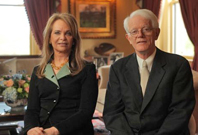 Investor Peter Lynch—well-known for growing the Fidelity Magellan fund from $18 million in assets in 1977 to $14 billion in 1990—brings his investing savvy to his giving. He and his wife and philanthropic partner, Carolyn, take special interest in high leverage philanthropy and have used a strategic approach to unlock success. Here are three keys they've used that other philanthropists may find useful.
Investor Peter Lynch—well-known for growing the Fidelity Magellan fund from $18 million in assets in 1977 to $14 billion in 1990—brings his investing savvy to his giving. He and his wife and philanthropic partner, Carolyn, take special interest in high leverage philanthropy and have used a strategic approach to unlock success. Here are three keys they've used that other philanthropists may find useful.
1. Be strategic in your risk-taking.
Through The Lynch Foundation, the Lynches fund startup organizations. "Peter and I are willing to take a risk," says Carol. "Sometimes they just don't work, but when they do it's a really exciting payoff." The Lynches have balanced that risk taking. For example, early in their philanthropy, the Lynches started their foundation. Peter points out that he and Carolyn have been able to grow their foundation’s assets tax free, which has allowed them to give more over time. "We’ve given away 3X, and the foundation’s worth 6X, so it’s been a good success and we’re doing more giving because of it," he says. "If we...didn’t have the foundation we wouldn’t be doing the kind of giving we’re doing."Peter Lynch explains the benefit of putting assets into a foundation
2. Have patience in establishing your philanthropy.
If you're "a brand-new philanthropist," Peter emphasizes that you should "take your time." He recommends conducting appropriate research before making any funding decisions. "I wouldn’t do anything for the first six, 12 months," he says. "Really study your systems, check with other people; see what other people have done a good job." Of course, no amount of research will create mistake-free philanthropy. Becoming effective in philanthropy, as with anything else, requires trial and error, says Peter. “You try approaches, you try [different] methods and keep refining it, and you learn from mistakes.” In other words, successful philanthropy requires an adaptive strategy.Related Content
- The Lynch Foundation and Teach for America
- Spotlights on Philanthropists' Strategy
- Researching a Nonprofit's Financials: Deep-Dive Approach, Moderate Approach, Financial Resources, Financial Audits
3. Conduct careful due diligence on the financials of potential grantees.
Carolyn says that proper due diligence—especially concerning a nonprofit's financials—is key in selecting grantees. "It’s important to understand exactly where they stand financially if you’re going to be making a financial contribution," she says. For example, are the finances of the organization you're considering entangled with another organization's financials under the same "umbrella"? Although it's not likely that an organization is intentionally hiding anything from you, "there are all sorts of things that can be lurking in those numbers," she says. "So I’ve learned to ask for help."Although philanthropy requires hard work to do well, the Lynches wouldn't have it any other way. My philanthropy is the belief that we’re all in it together, says Carolyn. "It’s really a feeling of kinship with other people," she says. The effect of that philanthropy on their lives has been tremendous. “Philanthropy’s really made us feel great,” says Peter. “It’s changed our life.”
See a full archive of the Peter and Carolyn Lynch's video interviews.
Advice on Creating Effective Philanthropy from Carolyn and Peter Lynch
In addition to the principles listed above, here are more ideas other philanthropists may find useful:- Start early and keep refining. Carolyn and Peter Lynch believe that philanthropy, which they refer to as an “acquired skill,” is a game of trial and error that takes time for improvement. As a result, they encourage other potential philanthropists to start giving early, so that they can build in the time to do their homework and learn. Watch: An acquired skill, Keep refining, and Do your homework.
- Practice venture philanthropy. Carolyn and Peter Lynch prefer providing smaller grants to young, innovative organizations. They believe that while philanthropic investments in these smaller and less known organizations may be risky, the potential return on investment is high. They hope that other larger philanthropies will pick up where they leave off and expand these organizations once proven effective. Watch: The Lynches helped give Partners in Health its start, “Hundred-bagger” ambition and Supporting small organizations.
- Don’t be afraid to fill a gap with a big bet. While Carolyn and Peter Lynch prefer to give smaller grants to young, innovative organizations, they are not afraid to make a big bet in partnership with an established organization to address a gaping need in the sector. Watch: Carolyn Lynch creates a new training program for principals.
- Invest in high leverage causes. Once Carolyn and Peter Lynch identified U.S. education as one of their causes, they decided to focus on early childhood education, the portion of the education continuum that expert research has proven to have high return on philanthropic investments. Watch: Extremely leveraged.
- Invest in your own capacity. Carolyn and Peter Lynch not only invest in the capacity of their grantees, but also in the capacity of their own Foundation. Whether through hiring key staff members, building a board to include issue area experts, or hiring strategy consultants, the Lynches are keen on meeting opportunities to improve the effectiveness of their grantmaking. Watch: One of the best decisions, Building a board, and Key hire.

